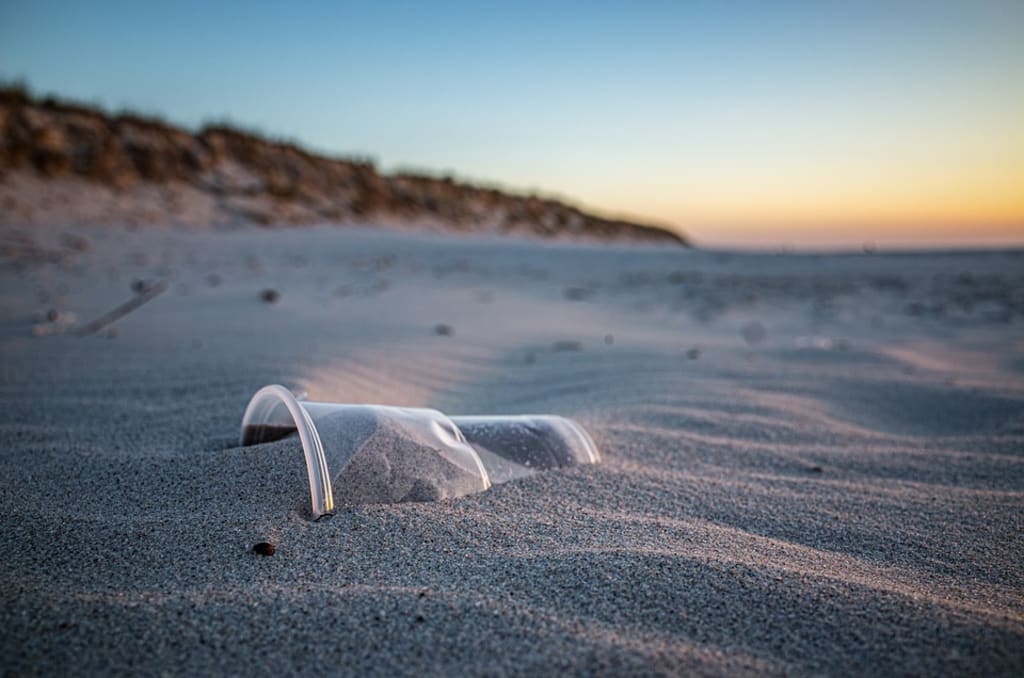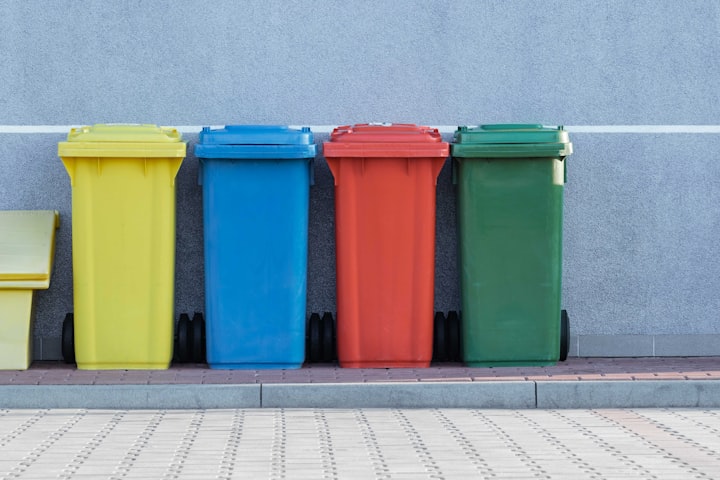On A Planet With So Much Water Why Would We Ruin Something We Depend On To Live? Three Simple Ways To Protect Our Environment And Our Futures.
For The Wave Makers Challenge

That'll end up in the sea, all it takes is one storm, one high tide coming in, and it's gone. Plastics can take from as little as 20 years and to as long as 500 years to decompose, depending on the materials and structure. Sunlight exposure helps to degrade or break down plastics. Like our skin, plastics absorb ultraviolet radiation from sunlight which breaks down molecules. Photodegradation is the name of the process and it's why landfills often expose plastic waste to the sun to quicken the process.
Thinking about plastics, a single-use plastic grocery bag can take about two decades to break down. In contrast, plastic water bottles made of PET (Polyethylene Terephthalate), a common form of plastic, can take approximately 450 years to fully break down.
All of the stores in my area sell, yes, I said sell, reusable bags to grocery shop with. One of the first things I did when I realized the length of time it could take a single-use grocery bag to break down, longer than it takes to raise a child from birth to near having to worry about drinking age, was to buy bags and keep them in the kitchen. That bag that ended up drifting in the wind, blowing out of the landfill, landing in the ocean, will be breaking down and polluting our environment until your children or grandchildren being born today are finishing their second year of college.

Bottles are perhaps the worst of the plastics that we have abused. I get why, for some people, it's important to have bottled water. I too live in a town with questionable drinking water. We've been told that we have far too many PSA's in our water. Our water infrastructure is old and our chief water source is the Mississippi River pumping station. However, every time I see a water bottle floating in the local lake, or one of the lakes I visit to fish, I realized I was part of the problem.
Investing in water filtration systems will take care of the fear of local drinking water. I imagine by now that everybody in Flint Michigan has done so that could afford one and if not, they've probably invested in a more portable, easier use, filtration system. At your local Wal-Mart or even Lowes or Menards, you can buy a Brita or Brita-type filtered pitcher to cool water in your refrigerator. They've even got containers you fill up and that have a pourable spout.
If we think that our water is bad now, wait until the billions of plastics that are degrading leech into the earth and into our water table. Every year more and more of these convenience bottles are ending up in the ocean as they blow off of landfills, end up in rivers, or are carelessly dumped and discarded.

Recycling our recyclables is not just for the environment, it makes sense. With more and more people on the planet, nearly four times the population we had less than one hundred years ago, and people living longer and longer, we are heading toward a point where resources will become scarce. Every day around the world, people throw away roughly four million tons of trash. That's enough to fill 350,000 garbage trucks. Items that can be recycled should be because they're reusable. As the population explodes, so does the space needed to store our trash. Consider this, that 350,000 garbage trucks filled every day with the trash are enough to stack to the height of 10 Empire State Buildings.

Understand that the world's population is only increasing, as I'm showing you below. The advantage of technologies and medical science have contributed to longer life spans. In just a period since 1927, we've gone from 2 billion people on this planet of ours to nearly 8 billion. The resources we have are the same. The size of our world is the same. The basics, like our need for air, water, and shelter are the same. Protecting our water supply is extremely important and we can do easy, small things, as a people, that will make a difference. Recycle plastics as well as our garbage, reuse things like shopping bags, make sure those used water bottles make it into the recycling bin or at least the trash so you're not leaving your mark on the world nearly four centuries later.
Don't forget to read the below figures. They show that we've been a world of more than consumers. We've also been a very amorous world. In less than a thousand years we've added nearly 25 times the population we had at the start of the 12th century. It's no wonder our effect on the planet's been so negative the past one hundred years.
I've you like this and found it to be informative then please feel free to share it with anyone or any group to who it might be helpful. Thank you as always for reading my work. I may not be the greatest writer yet so any thoughts or constructive critiques are more than welcome.
Jason Morton
Year Worlds Pop Yearly Net Density Urban Urban
Change Change P/KM2 Pop Pop %
2020 7,794,798,739 1.05 % 81,330,639 52 4,378,993,944 56 %
2019 7,713,468,100 1.08 % 82,377,060 52 4,299,438,618 56 %
2018 7,631,091,040 1.10 % 83,232,115 51 4,219,817,318 55 %
2017 7,547,858,925 1.12 % 83,836,876 51 4,140,188,594 55 %
2016 7,464,022,049 1.14 % 84,224,910 50 4,060,652,683 54 %
2015 7,379,797,139 1.16 % 84,506,374 50 3,981,497,663 54 %
2014 7,295,290,765 1.17 % 84,708,789 49 3,902,831,934 53 %
2013 7,210,581,976 1.19 % 84,753,917 48 3,824,990,329 53 %
2012 7,125,828,059 1.20 % 84,633,758 48 3,747,842,586 53 %
2011 7,041,194,301 1.21 % 84,370,698 47 3,671,423,872 52 %
2010 6,956,823,603 1.22 % 84,056,510 47 3,594,868,146 52 %
2009 6,872,767,093 1.23 % 83,678,407 46 3,516,830,263 51 %
2008 6,789,088,686 1.24 % 83,142,076 46 3,439,719,128 51 %
2007 6,705,946,610 1.24 % 82,428,777 45 3,363,609,560 50 %
2006 6,623,517,833 1.25 % 81,610,806 44 3,289,446,226 50 %
2005 6,541,907,027 1.25 % 80,747,638 44 3,215,905,863 49 %
2004 6,461,159,389 1.25 % 79,974,275 43 3,143,044,892 49 %
2003 6,381,185,114 1.26 % 79,411,926 43 3,071,743,997 48 %
2002 6,301,773,188 1.27 % 79,146,582 42 3,001,808,223 48 %
2001 6,222,626,606 1.29 % 79,132,783 42 2,933,078,510 47 %
2000 6,143,493,823 1.31 % 79,254,768 41 2,868,307,513 47 %
1999 6,064,239,055 1.33 % 79,445,113 41 2,808,231,655 46 %
1998 5,984,793,942 1.35 % 79,748,154 40 2,749,213,598 46 %
1997 5,905,045,788 1.38 % 80,153,837 40 2,690,813,541 46 %
1996 5,824,891,951 1.40 % 80,678,972 39 2,632,941,583 45 %
1995 5,744,212,979 1.43 % 81,062,552 39 2,575,505,235 45 %
1994 5,663,150,427 1.46 % 81,552,881 38 2,518,254,111 44 %
1993 5,581,597,546 1.50 % 82,677,737 37 2,461,223,528 44 %
1992 5,498,919,809 1.56 % 84,630,365 37 2,404,337,297 44 %
1991 5,414,289,444 1.63 % 87,058,383 36 2,347,462,336 43 %
1990 5,327,231,061 1.71 % 89,789,503 36 2,290,228,096 43 %
1989 5,237,441,558 1.79 % 92,015,550 35 2,233,140,502 43 %
1988 5,145,426,008 1.84 % 92,903,861 35 2,176,126,537 42 %
1987 5,052,522,147 1.85 % 91,954,235 34 2,118,882,551 42 %
1986 4,960,567,912 1.84 % 89,646,172 33 2,062,604,394 42 %
1985 4,870,921,740 1.82 % 86,910,119 33 2,007,939,063 41 %
1984 4,784,011,621 1.80 % 84,442,317 32 1,955,106,433 41 %
1983 4,699,569,304 1.78 % 82,182,762 32 1,903,822,436 41 %
1982 4,617,386,542 1.77 % 80,389,780 31 1,854,134,229 40 %
1981 4,536,996,762 1.77 % 78,993,248 30 1,804,215,203 40 %
1980 4,458,003,514 1.77 % 77,497,414 30 1,754,201,029 39 %
1979 4,380,506,100 1.76 % 75,972,599 29 1,706,021,638 39 %
1978 4,304,533,501 1.77 % 75,027,441 29 1,659,306,117 39 %
1977 4,229,506,060 1.80 % 74,839,196 28 1,616,419,308 38 %
1976 4,154,666,864 1.84 % 75,186,258 28 1,577,376,141 38 %
1975 4,079,480,606 1.89 % 75,686,434 27 1,538,624,994 38 %
1974 4,003,794,172 1.94 % 76,013,934 27 1,501,134,655 37 %
1973 3,927,780,238 1.98 % 76,129,993 26 1,462,178,370 37 %
1972 3,851,650,245 2.01 % 75,890,628 26 1,424,734,781 37 %
1971 3,775,759,617 2.04 % 75,322,571 25 1,388,834,099 37 %
1970 3,700,437,046 2.06 % 74,756,419 25 1,354,215,496 37 %
1969 3,625,680,627 2.09 % 74,081,500 24 1,319,833,474 36 %
1968 3,551,599,127 2.09 % 72,829,165 24 1,285,933,432 36 %
1967 3,478,769,962 2.08 % 70,847,332 23 1,252,566,565 36 %
1966 3,407,922,630 2.05 % 68,339,033 23 1,219,993,032 36 %
1965 3,339,583,597 2.00 % 65,605,259 22 1,188,469,224 36 %
1964 3,273,978,338 1.96 % 62,977,329 22 1,157,813,355 35 %
1963 3,211,001,009 1.92 % 60,580,214 22 1,122,561,940 35 %
1962 3,150,420,795 1.89 % 58,577,288 21 1,088,376,703 35 %
1961 3,091,843,507 1.87 % 56,893,759 21 1,055,435,648 34 %
1960 3,034,949,748 1.86 % 55,373,563 20 1,023,845,517 34 %
1959 2,979,576,185 1.84 % 53,889,480 20 992,820,546 33 %
1958 2,925,686,705 1.82 % 52,380,615 20 962,537,113 33 %
1957 2,873,306,090 1.80 % 50,862,808 19 933,113,168 32 %
1956 2,822,443,282 1.78 % 49,423,346 19 904,685,164 32 %
1955 2,773,019,936 1.77 % 48,173,195 19 877,008,842 32 %
1954 2,724,846,741 1.76 % 47,237,781 18 850,179,106 31 %
1953 2,677,608,960 1.78 % 46,747,398 18 824,289,989 31 %
1952 2,630,861,562 1.81 % 46,827,301 18 799,282,533 30 %
1951 2,584,034,261 1.88 % 47,603,112 17 775,067,697 30 %
1927 2,000,000,000
1900 1,600,000,000
1850 1,200,000,000
1804 1,000,000,000
1760 770,000,000
1700 610,000,000
1600 500,000,000
1500 450,000,000
1400 350,000,000
1200 360,000,000
1100 320,000,000
1000 275,000,000
900 240,000,000
800 220,000,000
About the Creator
Jason Ray Morton
I have always enjoyed writing and exploring new ideas, new beliefs, and the dreams that rattle around inside my head. I have enjoyed the current state of science, human progress, fantasy and existence and write about them when I can.






Comments
There are no comments for this story
Be the first to respond and start the conversation.